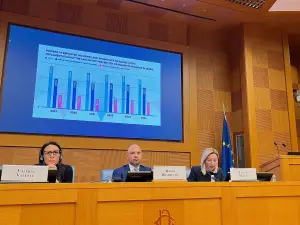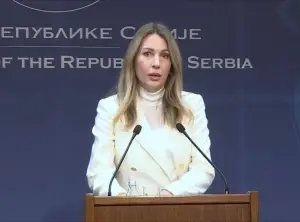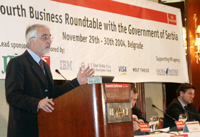- Serbia
Get to know Serbia
- Citizens
Culture and science
Health services
Pension and disability insurance
- Business
Employment
Economy
- Media
- Government
- Contact
Keep in touch
Contact form
Back
Keepin touch
Whether you have a question, comment, suggestion or any problem in the purview of the government, send us your message and we will try to respond as soon as possible. If your problem is not in our purview, we will forward your message to the relevant institution.
Q:
A:
Serbian government to press ahead with structural reform
Belgrade,
29 November 2004
Serbian Deputy Prime Minister Miroljub Labus said today that the government is determined to press ahead with structural reforms in 2005 and to improve in the second stage of economic transition.
He told the 4th Round Table with the Government of Serbia, organised by London magazine the Economist at the Hyatt Hotel, that more laws will be passed, but added that the enforcement of existing ones is even more important.
He stressed that regulations governing the tender privatisation process must be updated so as to eliminate bidders who are “not serious”.
Labus stressed that debts of large enterprises are the biggest problem and that they must be “centralised” along with the adoption of rules to define the way in which the state should take over these debts.
Labus announced a larger numbers of tender sales of socially-owned companies but he warned that restitution of property poses a much bigger problem.
He announced that restructuring of Serbia’s infrastructure enterprises will be continued next year, adding that the energy sector will not be privatised yet, although it is uncertain whether the telecommunications industry will go private.
Investment, according to Labus, must maintain its double-digit growth rate, noting that this compels the government to further improve the country’s investment climate.
He explained that investors’ problems with obtaining building sites are not under the state’s jurisdiction but rather under the jurisdiction of municipal authorities.
He also reassured foreign investors, saying that the value added tax (VAT) will be implemented properly but he added that a period of three months will be required for “adjustment”.
He said that inflation has reached 10 percent this year due to higher energy costs but he promised that it will not go up in 2005.
Labus also reprimanded foreign investors for their tendency to undervalue domestic companies in the process of privatisation, thus putting the discount rate at 19 to 20 percent. With this fiscal rate, he explained, no company can perform well.
He also warned that privatised companies are not creating new jobs and that foreign companies are trying to establish a monopoly in the Serbian market.
He also pointed to discrimination against the elderly work force, adding that foreign firms are running ads in Serbia that would be banned in their own countries.
Labus expressed conviction, however, that foreign investors have come here to stay rather than just seize the opportunity and that their activity will facilitate economic growth in Serbia.
He stressed that regulations governing the tender privatisation process must be updated so as to eliminate bidders who are “not serious”.
Labus stressed that debts of large enterprises are the biggest problem and that they must be “centralised” along with the adoption of rules to define the way in which the state should take over these debts.
Labus announced a larger numbers of tender sales of socially-owned companies but he warned that restitution of property poses a much bigger problem.
He announced that restructuring of Serbia’s infrastructure enterprises will be continued next year, adding that the energy sector will not be privatised yet, although it is uncertain whether the telecommunications industry will go private.
Investment, according to Labus, must maintain its double-digit growth rate, noting that this compels the government to further improve the country’s investment climate.
He explained that investors’ problems with obtaining building sites are not under the state’s jurisdiction but rather under the jurisdiction of municipal authorities.
He also reassured foreign investors, saying that the value added tax (VAT) will be implemented properly but he added that a period of three months will be required for “adjustment”.
He said that inflation has reached 10 percent this year due to higher energy costs but he promised that it will not go up in 2005.
Labus also reprimanded foreign investors for their tendency to undervalue domestic companies in the process of privatisation, thus putting the discount rate at 19 to 20 percent. With this fiscal rate, he explained, no company can perform well.
He also warned that privatised companies are not creating new jobs and that foreign companies are trying to establish a monopoly in the Serbian market.
He also pointed to discrimination against the elderly work force, adding that foreign firms are running ads in Serbia that would be banned in their own countries.
Labus expressed conviction, however, that foreign investors have come here to stay rather than just seize the opportunity and that their activity will facilitate economic growth in Serbia.
-
 Belgrade, 21 November 2025
Belgrade, 21 November 2025Joint commitment to strengthen bilateral ties between Serbia, Botswana
-
 Belgrade/Rome, 21 November 2025
Belgrade/Rome, 21 November 2025Serbian government’s strong commitment to combating violence against women
-
 Belgrade, 18 November 2025
Belgrade, 18 November 2025Serbia remains committed to open dialogue, cooperation with OSCE
-
 Belgrade, 18 November 2025
Belgrade, 18 November 2025Cooperation with WHO to strengthen protection for victims of violence
-
 Belgrade, 18 November 2025
Belgrade, 18 November 2025Germany ready to accompany Serbia on its path towards EU
-
 Belgrade, 16 November 2025
Belgrade, 16 November 2025Solution for NIS must be found by next week
-
 Belgrade, 15 November 2025
Belgrade, 15 November 2025United States sends request for Russian ownership to exit NIS
-
 Belgrade, 13 November 2025
Belgrade, 13 November 2025Serbia continues to be reliable partner of EU
-
 Belgrade, 13 November 2025
Belgrade, 13 November 2025European integration, preserving peace, stability priorities for Serbia
-
 Belgrade, 13 November 2025
Belgrade, 13 November 2025Cooperation agreement signed for preparation of Specialised Expo 2027

